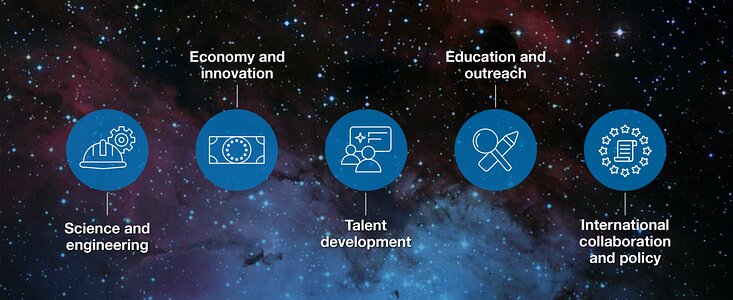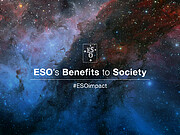Mededeling
How ESO Impacts Society: New publication highlights ESO’s benefits to its Member States
22 januari 2021
The European Southern Observatory (ESO) is a testament to research, innovation, and collaboration in Europe with a far reaching and invaluable impact on society. The new publication “ESO’s Benefits to Society” explores ESO’s contributions to its Member States across five areas: science and engineering, economy and innovation, talent development, education and outreach, and international collaboration and policy.
In science and engineering, ESO and its telescopes have been instrumental in several ground-breaking discoveries. In 2020, for example, a Physics Nobel Prize was awarded for research on the Milky Way’s black hole done with ESO telescopes. ESO enables discoveries such as this by constructing and operating world-leading observatories, which push the boundaries of engineering.
ESO innovations extend beyond the organisation’s remit; for example, techniques from MUSE, an instrument on ESO’s Very Large Telescope, are being transferred for use in medicine and cancer diagnostics. ESO additionally provides economic benefits to society. In 2019, 60% of ESO’s budget was invested in the design and construction of telescopes and instruments. Over 90% of that was invested in high-tech innovation led by industry and research institutions in the Member States.
In talent development, ESO has played a crucial role in the enrichment and development of highly skilled astronomers, engineers and technical experts. In the last 10 years alone, ESO has trained over 260 students from more than 40 countries in science and engineering. This expertise finds application in other areas of industry and public life, as ESO alumni go on to careers in education, business development, programme and project management, and media and communications.
ESO’s communication, education and outreach activities harness the innate curiosity about the Universe to increase scientific literacy in society, and to inspire more children to engage in science, technology, engineering and mathematics fields. Over the last 10 years, ESO has featured in 46 online press articles per day on average, and since 2018 the ESO Supernova Planetarium & Visitor Centre has hosted 132 000 visitors to planetarium shows and 13 000 visitors on guided tours.
As a collaborative and international organisation, ESO is able to bring countries together to create a scientific and political capacity for development that is beyond the reach of its individual Member States. ESO therefore stands out as a role model in research and development and is a cornerstone of the European Research Area in astronomy.
All of ESO's contributions to society are perfectly exemplified in the building of the ambitious and revolutionary Extremely Large Telescope (ELT), ESO’s upcoming flagship telescope set to see first light this decade. ESO’s ELT will dramatically change what we know about our Universe and will make us rethink our place in the cosmos.
“ESO has provided three key benefits to the European and global community: first, a world-class observatory system that generates many efficiencies for national astronomy communities in terms of its operations and options for instrumentation, and possibilities to host national projects in the observatory; second, a deep body of experience in the management of megaprojects in astronomy; and third, a stable framework that has allowed countries to fairly pool resources to enable these world-leading projects. A project like the ELT is only possible in Europe with ESO,” says Nobel Laureate Didier Queloz.
The full “ESO’s Benefits to Society” publication is available online now.
Links
Contact
Anna-Lynn Wegener
ESO Head of Communications
Garching bei München, Germany
Email: Anna-Lynn.Wegener@eso.org
Over de Mededeling
| Id: | ann21002 |
Our use of Cookies
We use cookies that are essential for accessing our websites and using our services. We also use cookies to analyse, measure and improve our websites’ performance, to enable content sharing via social media and to display media content hosted on third-party platforms.
ESO Cookies Policy
The European Organisation for Astronomical Research in the Southern Hemisphere (ESO) is the pre-eminent intergovernmental science and technology organisation in astronomy. It carries out an ambitious programme focused on the design, construction and operation of powerful ground-based observing facilities for astronomy.
This Cookies Policy is intended to provide clarity by outlining the cookies used on the ESO public websites, their functions, the options you have for controlling them, and the ways you can contact us for additional details.
What are cookies?
Cookies are small pieces of data stored on your device by websites you visit. They serve various purposes, such as remembering login credentials and preferences and enhance your browsing experience.
Categories of cookies we use
Essential cookies (always active): These cookies are strictly necessary for the proper functioning of our website. Without these cookies, the website cannot operate correctly, and certain services, such as logging in or accessing secure areas, may not be available; because they are essential for the website’s operation, they cannot be disabled.
Functional Cookies: These cookies enhance your browsing experience by enabling additional features and personalization, such as remembering your preferences and settings. While not strictly necessary for the website to function, they improve usability and convenience; these cookies are only placed if you provide your consent.
Analytics cookies: These cookies collect information about how visitors interact with our website, such as which pages are visited most often and how users navigate the site. This data helps us improve website performance, optimize content, and enhance the user experience; these cookies are only placed if you provide your consent. We use the following analytics cookies.
Matomo Cookies:
This website uses Matomo (formerly Piwik), an open source software which enables the statistical analysis of website visits. Matomo uses cookies (text files) which are saved on your computer and which allow us to analyze how you use our website. The website user information generated by the cookies will only be saved on the servers of our IT Department. We use this information to analyze www.eso.org visits and to prepare reports on website activities. These data will not be disclosed to third parties.
On behalf of ESO, Matomo will use this information for the purpose of evaluating your use of the website, compiling reports on website activity and providing other services relating to website activity and internet usage.
Matomo cookies settings:
Additional Third-party cookies on ESO websites: some of our pages display content from external providers, e.g. YouTube.
Such third-party services are outside of ESO control and may, at any time, change their terms of service, use of cookies, etc.
YouTube: Some videos on the ESO website are embedded from ESO’s official YouTube channel. We have enabled YouTube’s privacy-enhanced mode, meaning that no cookies are set unless the user actively clicks on the video to play it. Additionally, in this mode, YouTube does not store any personally identifiable cookie data for embedded video playbacks. For more details, please refer to YouTube’s embedding videos information page.
Cookies can also be classified based on the following elements.
Regarding the domain, there are:
- First-party cookies, set by the website you are currently visiting. They are stored by the same domain that you are browsing and are used to enhance your experience on that site;
- Third-party cookies, set by a domain other than the one you are currently visiting.
As for their duration, cookies can be:
- Browser-session cookies, which are deleted when the user closes the browser;
- Stored cookies, which stay on the user's device for a predetermined period of time.
How to manage cookies
Cookie settings: You can modify your cookie choices for the ESO webpages at any time by clicking on the link Cookie settings at the bottom of any page.
In your browser: If you wish to delete cookies or instruct your browser to delete or block cookies by default, please visit the help pages of your browser:
Please be aware that if you delete or decline cookies, certain functionalities of our website may be not be available and your browsing experience may be affected.
You can set most browsers to prevent any cookies being placed on your device, but you may then have to manually adjust some preferences every time you visit a site/page. And some services and functionalities may not work properly at all (e.g. profile logging-in, shop check out).
Updates to the ESO Cookies Policy
The ESO Cookies Policy may be subject to future updates, which will be made available on this page.
Additional information
For any queries related to cookies, please contact: pdprATesoDOTorg.
As ESO public webpages are managed by our Department of Communication, your questions will be dealt with the support of the said Department.


